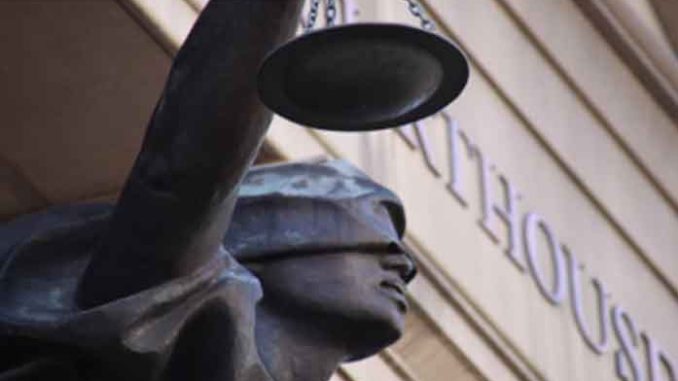
A federal judge in New York ruled last week that a Tucson man must remain in the custody of U.S. Marshals Service (USMS) after violating his conditions of pretrial release in a case involving the distribution of cocaine in Rochester, New York.
 Guillermo Garcia was arrested in August 2019 at a hotel in Rochester after his alleged co-conspirator Ruben Moran Bustamante was pulled over for a traffic stop with more than 11 pounds of cocaine in the vehicle. Bustamante reportedly incriminated himself, Garcia, and another co-conspirator, Jair Abraham Gil Valdez, during a post-Miranda interview with federal agents.
Guillermo Garcia was arrested in August 2019 at a hotel in Rochester after his alleged co-conspirator Ruben Moran Bustamante was pulled over for a traffic stop with more than 11 pounds of cocaine in the vehicle. Bustamante reportedly incriminated himself, Garcia, and another co-conspirator, Jair Abraham Gil Valdez, during a post-Miranda interview with federal agents.
Garcia had been allowed to return to Arizona while awaiting trial on one count of conspiracy to distribute cocaine and one count of sale or distribution of cocaine. He posted a $100,000 appearance bond which is secured by a residence in Tucson, according to court records.
However, Garcia was arrested in Tucson on a federal warrant in June and transported by U.S. Marshals back to New York. On July 29, a magistrate judge with the Western District of New York ruled Garcia must remain in custody until trial due to “clear and convincing evidence” he violated the terms of his pretrial release, and “it would be unlikely” he would comply if released.
Court records show Garcia, Bustamante, and Valdez were arrested Aug. 8, 2019 after a deputy with the Erie County (New York) Sheriff’s Office made a traffic stop of a Ford Explorer. The driver presented an Arizona driver’s license listed to Francisco Moran Bustamante.
However, after the driver admitted not knowing his age listed on the license, he stated his real name was Ruben Moran Bustamante and the license belonged to his brother. Bustamante also stated he was unlawfully in the United States and had been previously deported and then admitted to having “something illegal” in the vehicle.
That something turned out to be a black backpack containing five shrink-wrapped packages. The packages contained cocaine, according to the criminal complaint authored by a special agent with Homeland Security Investigations (HSI).
“After Miranda warnings were administered to Bustamante, he said that he understood and was willing to waive those rights and speak with law enforcement officers,” the complaint states.
The complaint also states Bustamante said he received the cocaine from Garcia at a hotel in Rochester, New York. Valdez was staying at the same hotel and supplied Garcia with the cocaine, Bustamante purportedly told investigators.
“Bustamante and Garcia stayed in room 406 while Valdez stayed in another room rented by Garcia,” the complaint states. “Bustamante was told to bring back the money from the sale of the cocaine to Garcia.”
A hotel room key was found in the vehicle. Valdez was located and arrested at the hotel. He told investigators he was in Rochester, New York to see a Yankees game with friends.
Agents then went to the room Bustamante claimed he was sharing with Garcia, but Garcia said he was the only person staying in the room.
“Garcia stated that he was in town by himself to visit Niagara Falls, NY,” the complaint states. “Garcia claimed ownership of the luggage in the room.”
Then during a search of that luggage, investigators found a cell phone, an old Amtrak ticket, and bank account information in the name of Francisco Bustamante. Garcia insisted the items were not his, “and he did not know how they ended up in his luggage,” the complaint states.
After Garcia’s arrest, he was released from custody by a judge despite objections by the U.S. Attorney’s Office, which expressed concern that Garcia would continue to engage in unlawful drug activities. The conditions of his release included home confinement, electronic ankle monitoring, and no contact with his co-defendants.
Last December, a different judge eased Garcia’s conditions of release, setting a curfew instead of home confinement. But in March, the U.S. Probation Service reported that Garcia had used alcohol, violated his curfew, and tested positive for cocaine, something he admitted.
Assistant U.S. Attorney Michael Adler filed a motion for revocation of Garcia’s pre-trial release order, highlighting the test results given that Garcia previously denied ever using the drug.
“Common sense tells us that either 1) the defendant lied to Probation initially, 2) the defendant decided to use cocaine for the first time while under pre=trial release with flagrant disregard of the Court’s order, or 3) the defendant sampled cocaine intended for distribution to others,” Adler argued.
Instead, a judge merely voided Garcia’s curfew order and placed him back on home confinement. Then on May 22, U.S. Magistrate Judge Michael Roener signed an arrest warrant for Garcia’s arrest. The reason for the warrant is not explained in public documents.
Garcia was taken into custody June 5 and sent to Buffalo for the July 29 hearing.
No trial date has been set, in part due to COVID-19 delays within the federal court system. However, the parties are scheduled to be back in court Sept. 15 for pretrial motions.
Meanwhile, Valdez, was released last September to await trial after posting a $40,000 secured and $60,000 unsecured bond.
Public records show Bustamante was deported from the United States in September 2011 after being convicted of a felony offense. He faces the same two drug charges as Garcia and Valdez, along with one count of violating U.S. immigration laws.

